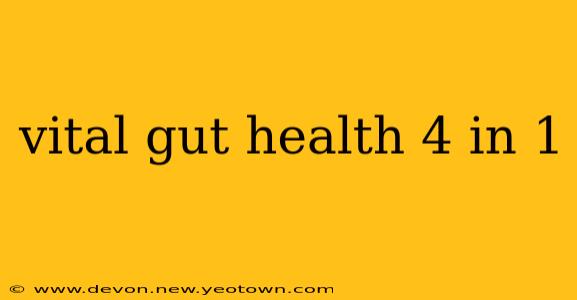Our gut. That incredible, complex ecosystem residing within us, quietly working away, impacting everything from our mood to our immune system. It’s often overlooked, yet its health is fundamentally linked to our overall well-being. This isn’t just about avoiding stomach aches; it’s about thriving. This article explores a four-pronged approach to achieving vital gut health, focusing on diet, probiotics, stress management, and mindful movement.
What are the Key Factors Affecting Gut Health?
This is a crucial question, as understanding the root causes allows us to effectively address them. The interconnectedness of diet, stress, physical activity, and the gut microbiome is undeniable. Let's unpack these factors individually.
1. Diet: Fueling Your Inner Ecosystem
Imagine your gut as a vibrant garden. What you feed it dictates its flourishing or decline. A diet rich in processed foods, sugar, and unhealthy fats creates an environment where harmful bacteria can thrive, leading to inflammation and digestive distress. Conversely, a diet brimming with fruits, vegetables, whole grains, and lean protein nurtures beneficial bacteria, promoting a balanced microbiome.
What foods specifically support gut health? Think fiber-rich foods like berries, leafy greens, and legumes. These feed the beneficial bacteria, promoting their growth and activity. Fermented foods like yogurt (with live cultures), kefir, sauerkraut, and kimchi introduce beneficial bacteria directly into your gut.
2. Probiotics: Introducing Beneficial Bacteria
Probiotics are live microorganisms that, when ingested in adequate amounts, confer a health benefit on the host. Essentially, they're friendly bacteria that help restore balance to your gut microbiome. They can be found in fermented foods, or taken as supplements. However, it's crucial to choose reputable brands with strains backed by research.
What are the different types of probiotics, and how do I choose the right one for me? There are many strains of probiotics, each with its own specific benefits. Lactobacillus and Bifidobacterium are two of the most common and well-researched genera. The best probiotic for you depends on your individual needs and health goals. Consulting a healthcare professional can help you determine the best choice.
3. Stress Management: Calming the Gut-Brain Axis
The connection between our gut and brain is profound, a bidirectional communication pathway known as the gut-brain axis. Chronic stress significantly impacts gut health, often leading to inflammation and digestive issues. Practicing stress-reducing techniques is crucial for maintaining a healthy gut.
How does stress affect my gut health, and what strategies can I use to mitigate its effects? Stress triggers the release of hormones like cortisol, which can disrupt the delicate balance of the gut microbiome. Effective stress-management techniques include mindfulness meditation, yoga, deep breathing exercises, and spending time in nature.
4. Mindful Movement: Promoting Gut Motility
Physical activity benefits not only our physical health but also our digestive health. Exercise promotes gut motility, improving the movement of food through the digestive tract and preventing constipation. It also reduces stress, further contributing to a healthy gut.
What type of exercise is best for gut health, and how much should I aim for? Any form of regular physical activity is beneficial. Aim for at least 30 minutes of moderate-intensity exercise most days of the week. Activities like walking, swimming, cycling, or yoga are all excellent choices.
Conclusion: Cultivating a Thriving Inner Garden
Achieving vital gut health is a holistic journey, a commitment to nurturing the intricate ecosystem within. By focusing on these four key areas—diet, probiotics, stress management, and mindful movement—we can create an environment where beneficial bacteria thrive, promoting optimal digestive health and overall well-being. Remember, it's a journey, not a race. Start small, be consistent, and listen to your body. Your gut will thank you for it.

